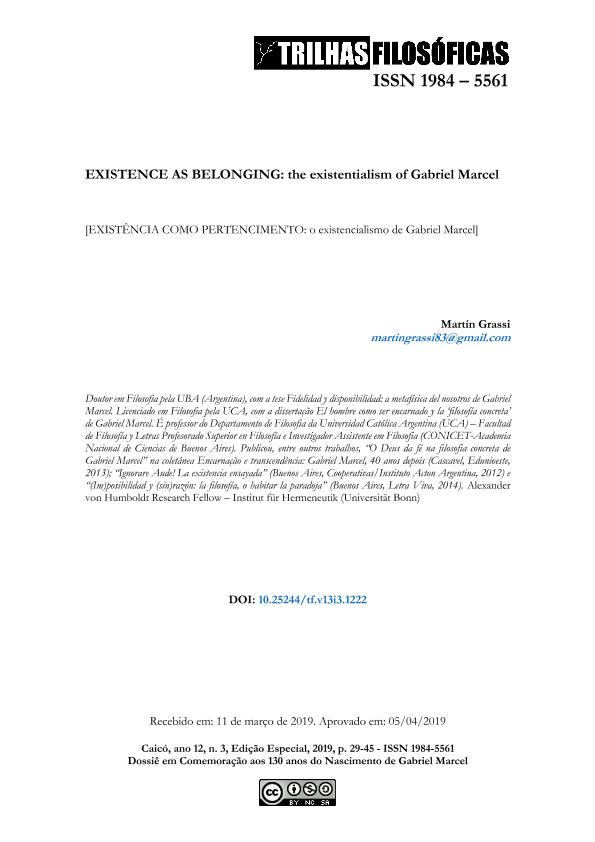Mostrar el registro sencillo del ítem
dc.contributor.author
Grassi, Martín

dc.date.available
2022-09-13T17:50:17Z
dc.date.issued
2020-03-30
dc.identifier.citation
Grassi, Martín; Existence as belonging: the existentialism of Gabriel Marcel; Universidade do Estado do Rio Grande do Norte. Departamento de Filosofia; Trilhas Filosóficas; 12; 3; 30-3-2020; 29-45
dc.identifier.issn
1984-5561
dc.identifier.uri
http://hdl.handle.net/11336/168581
dc.description.abstract
Existentialism is usually considered to be a philosophy of the individual selfaffirmation. However, the existential philosophy of Gabriel Marcel stresses belonging (participation) and community as the core concepts to understand human existence. Human existence belongs to the world, to other fellow beings, to Being itself and to the Transcendent. By stressing belonging, Marcel gives a radical new perspective on freedom and metaphysics, for being can only be welcomed, and the whole dynamics of freedom is about answering to the Other’s calling. This peculiar kind of existentialism, thus, can play a major role today in the philosophical debate, mainly by avoiding the dialectical opposition between the Self and the Other. Marcel’s philosophy offers some central insights on the meaning of the word “with”, and, thus, questions our understanding of community and being-with.
dc.description.abstract
O existencialismo é normalmente considerado uma filosofia da auto-afirmação. Entretanto, a filosofia existencial de Gabriel Marcel enfatiza o pertencimento (participation) e a comunidade como os conceitos fulcrais para compreender a existência humana. A existência humana pertence ao mundo, a outros seres semelhantes, ao Ser em si mesmo e ao Transcendente. Ao enfatizar o pertencimento, Marcel oferece uma nova e radical perspectiva sobre a liberdade e a metafísica, pois o ser não pode senão ser acolhido, e a dinâmica inteira da liberdade é sobre responder ao chamado do Outro. Esse tipo particular de existencialismo, portanto, pode desempenhar hoje um papel proeminente no debate filosófico, principalmente por evitar a oposição dialética entre o Eu e o Outro. A filosofia de Marcel oferece algumas percepções centrais sobre o significado da palavra “com” e, portanto, questiona a nossa compreensão da comunidade e do ser-com.
dc.format
application/pdf
dc.language.iso
eng
dc.publisher
Universidade do Estado do Rio Grande do Norte. Departamento de Filosofia
dc.rights
info:eu-repo/semantics/openAccess
dc.rights.uri
https://creativecommons.org/licenses/by-nc-sa/2.5/ar/
dc.subject
EXISTENCE
dc.subject
BELONGING
dc.subject
METAPHYSICS
dc.subject
COMMUNION
dc.subject
ETHICS
dc.subject
RELIGION
dc.subject.classification
Filosofía, Historia y Filosofía de la Ciencia y la Tecnología

dc.subject.classification
Filosofía, Ética y Religión

dc.subject.classification
HUMANIDADES

dc.title
Existence as belonging: the existentialism of Gabriel Marcel
dc.title
Existência como pertencimento: o existencialismo de Gabriel Marcel
dc.type
info:eu-repo/semantics/article
dc.type
info:ar-repo/semantics/artículo
dc.type
info:eu-repo/semantics/publishedVersion
dc.date.updated
2022-09-12T14:19:15Z
dc.identifier.eissn
1982-7490
dc.journal.volume
12
dc.journal.number
3
dc.journal.pagination
29-45
dc.journal.pais
Brasil

dc.journal.ciudad
Río Grande del Norte
dc.description.fil
Fil: Grassi, Martín. Pontificia Universidad Católica Argentina "Santa María de los Buenos Aires"; Argentina. Academia Nacional de Ciencias de Buenos Aires. Centro de Estudios Filosóficos "Eugenio Pucciarelli"; Argentina. Consejo Nacional de Investigaciones Científicas y Técnicas; Argentina
dc.journal.title
Trilhas Filosóficas
dc.relation.alternativeid
info:eu-repo/semantics/altIdentifier/url/http://natal.uern.br/periodicos/index.php/RTF/article/view/1222
dc.relation.alternativeid
info:eu-repo/semantics/altIdentifier/doi/http://dx.doi.org/10.25244/tf.v13i3.1222
Archivos asociados
